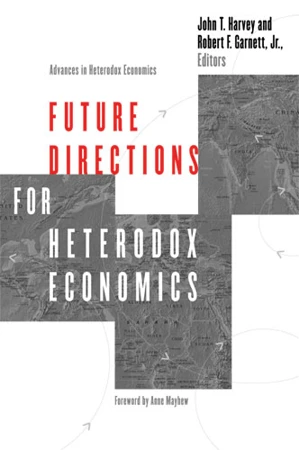Future Directions for Heterodox Economics

Blurb
Twenty-first-century economists will have to understand and improve a post-Cold War world in which no single economic theory or system holds the key to human betterment. Heterodox economists have much to contribute to this effort, as a wave of pluralism spawns new lines of research and new dialogues among non-mainstream economists. Future Directions for Heterodox Economics showcases a range of contributions to contemporary economic theory and policy, bringing together essays that range from mathematical to philosophical, critical to positive, and pro-market to socialist and making innovative connections between formerly separate theoretical traditions---Marxian, Austrian, feminist, ecological, Sraffian, institutionalist, and post-Keynesian. Unlike any previous collection, this volume shows the surprising extent to which pluralism is engendering controversy, critical dialogue, and innovative new directions within heterodox economics.
"This book provides an excellent sampler of work from the cutting edge of heterodox economics. People looking for fresh ideas about how the discipline can reinvent itself, so as to broaden and modernize its knowledge practices and reprioritize questions of how economic knowledge can be used to promote the common good, will find much of interest in this well-constructed book."
---Martha A. Starr, Professor of Economics, American University, and coeditor of the Review of Social Economy
"Those interested in recent developments and controversies in non-mainstream economics will find this volume a most welcome addition to the literature. The editors have chosen papers wisely, selecting those that allow both initiates and more seasoned individuals a good introduction to the nature and range of heterodox economics, the issues that constitute the basis of ongoing debate among economists of these stripes, and the arguments that have been developed to support pleas for a pluralist or a monist path of development."
---John F. Henry, Department of Economics, University of Missouri, Kansas City
"After sixty years, economics' formalist neoclassical mainstream is in terminal decline. The future is heterodox. Harvey and Garnett's book is the best guide to that future that you will find. It should be read cover to cover."
---Edward Fullbrook, Professor of Economics, University of the West of England

